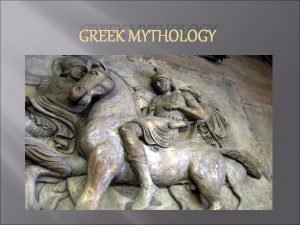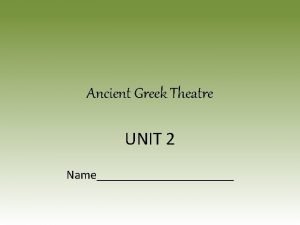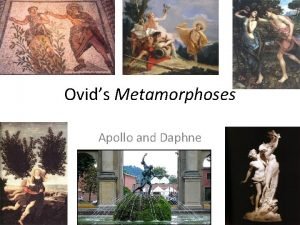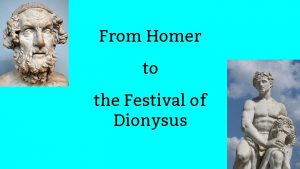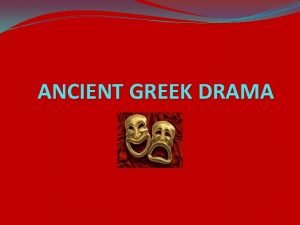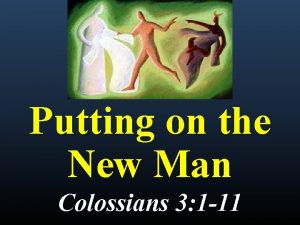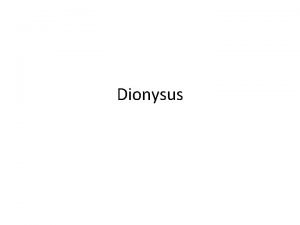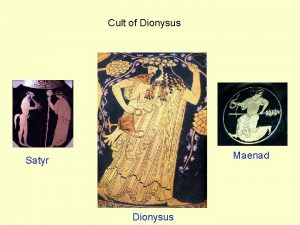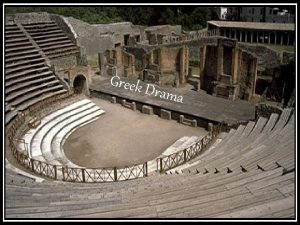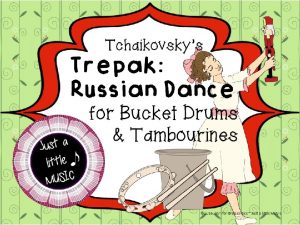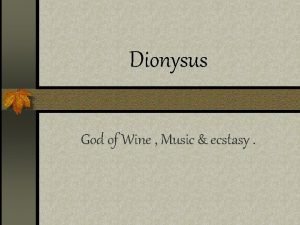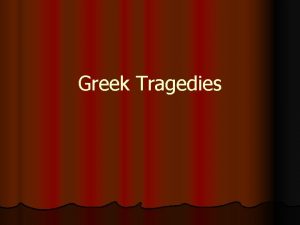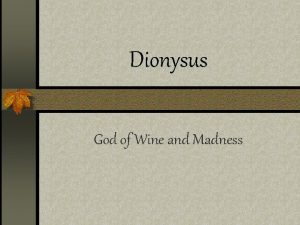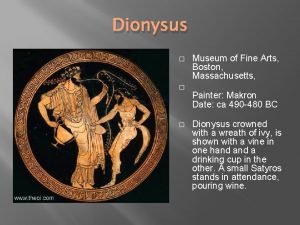Putting on a play at City Dionysus City





















- Slides: 21

Putting on a play at City Dionysus

City Dionysia • • One week in late March Opening of the port Many visitors Civic and religious event Sponsored by the City and wealthy citizens Huge event Weeklong Super Bowl in a city-state

April • Shortly after the previous festival, writers apply to the city’s chief magistrate (Archon) • Archon listened to the selections of the play presented by the playwright • Selected 3 Tragedies • Assigned them Choruses • Assigned them a Choregos

Choregus • Like a producer • Responsible for – Chorus training – Costuming for Chorus – Paid musicians – Supplied properties – Extra actors – May have provided 2 nd chorus

State Provided • • • Building/Theatre Prizes Paid actors, maybe the playwright Some costumes Subsidized tickets Tickets – Bronze or lead – Looked like coins/tokens with a letter on one side, Athena on the other – Letter corresponded to the seating section

Rehearsals • Playwright – – Acted as a director Invented music and dances Also often acted Sophocles did not act • Bad voice • Played music • Didaskolos – Specialist in theatre – Instructed the chorus in speech and movement – Aristophanes did not direct his plays, hired a Didaskolos

March • Few days before festival – Playwrights and actors announce the subject of their play • Previews – Procession – reenactment of Dionysus coming to Athens • Dances at altars • Sacrifice a bull at altar of Dionysus

Five Days of Theatre • 3 days (at least) Tragedies – One dramatist a day • 3 tragedies • 1 Satyr play • Comedies – May have been up to five comedies at the festival – Possibly one a day • 2 Days of Dithyrambic Contests – 10 choruses of adult men, 10 of boys

Prizes and Punishments • Best Play and playwright • Best Choregus – Could erect a statue of themself at their expense • Best Actor (449 BC) • Best Chorus • Punishments were handed out 2 days after festival for bad behavior

Acting • • Masked – three actors could play many parts All men Extras could be used in non-speaking parts Early Playwrights chose actors, later city assigned actors to keep things fair

Judging the tragic actor • Beauty • Power and timbre of voice • Gesture and movement – Broad and stylised • Declamatory style

Comic actors • • • Wore masks Short buskins or boots Phalluses Short tunics Very physical

Chorus • • • In the beginning, 50 people Thespis – 1 Actor, 50 Chorus Aeschylus- 2 actors, 12 chorus Sophocles – 3 actors, 15 chorus Aristophanes – 3 or more actors, 24 chorus

Chorus • Parodos – entered theatre, often after the prologue • Very stately • Choral passages mainly sung and danced in unison • Sometimes divided into two groups, took turns • Last ode was called the exodos

Chorus • Chorus moved in formal patterns during odes • Odes – song sung by choruse – Strophe – danced from stage right to left – Antistrophe – danced from stage left to right – Epode – song sung by the Chorus while standing still after singing the strophe and antistrophe

Visual Aspects of Performance • Scenery – conventions were different from our own • Skene – represented many places, used the doors and the roof for higher levels • Scene Painting – Aristotle credited Sophocles to adding scene painting – Roman Archetech Vitruvius claims it was Aeschylus

Types of scenery • Flats or flat panels- Pinakes • Triangular rotating scenery – Periakotoi • `Ekkyklema’ – “something that can be rolled out” wheeled platform or wagon – Tableau of actors • Scenes of carnage or death • Could be pushed through the central doors

Deux ex machina • Mechane- crane, used to swing actors on stage, to simulate flight. Used at end of Medea, often associated with Euripides, who often used the crane. • Deux ex machina is used to describe any contrived ending.

Costumes • Tragic actor – loose fitting ankle length tunic or chiton, high topped boots, loose fitting sleeves though sometimes sleeveless. • Symbolic Costumes • Comic actors – wore flesh colored tights, short chiton, often padding across the stomach and visible phallus. • Satyrs – goatskin loincloths with tail and phallus over spotted tights. • All wore masks – Portrait masks of famous Athenians

Music • Greeks regarded music and dance as mimetic • Odes sung while accompanied by a flute • Sometimes playwright wrote the music but often it was the flute player.

Audience • 10, 000 – 30, 000 people per show • There all day, probably able to buy food and drinks in theatre but also brought wine, fruit and refreshments to eat (and sometime to throw at actors) • Theatron divided into sections • Front row for priests of Dionysus. • Special sections for archons, city officials, generals, representatives of the 10 tribes, ambassadors and women • Might hiss at actors but also very responsive to tragic moments, may cry or be very silent.
 Hera roman name realm and symbol
Hera roman name realm and symbol Percy jackson and the lightning thief dionysus
Percy jackson and the lightning thief dionysus What is aphrodite's strengths and weaknesses
What is aphrodite's strengths and weaknesses Artemis roman name and symbol
Artemis roman name and symbol Greek roman equivalents
Greek roman equivalents Diagram of greek theatre
Diagram of greek theatre Apollo theoi
Apollo theoi The festival of dionysus
The festival of dionysus Dionysus god of theatre
Dionysus god of theatre The bishop orders his tomb
The bishop orders his tomb The cult of dionysus theater
The cult of dionysus theater Play random play basketball
Play random play basketball Typewriter types
Typewriter types Play within the play hamlet
Play within the play hamlet I've got a friend we like to play we play together
I've got a friend we like to play we play together Putting the pieces together case study answer key
Putting the pieces together case study answer key Putting it all together
Putting it all together Strategic organization speech
Strategic organization speech Putting-out system
Putting-out system Letters put together
Letters put together Non physical fences example
Non physical fences example Putting on the new man
Putting on the new man
